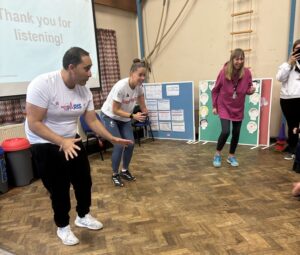We take a look at the Get Set schools activation events which aimed to use the Paris Olympics & Paralympics to inspire children to activity.

School’s in: Inside the Get Set activation days reducing inactivity for schoolchildren

The buzz of a new academic year is exciting for any child. It’s no different for the attendees of Ysgol Bro Cinmeirch, a small primary school in Llanrhaeadr, Denbighshire – a village in North Wales so rural that the local minicab companies pitch in to help with the morning school run each day. And yet, kids as young as 3 and as old as 11 are keenly focused as the Get Set programme brings them an afternoon of games and activities and a rare visit from a Paralympic medallist.
Get Set is the youth engagement programme delivered by the British Olympic Foundation and British Paralympic Association with funding from Sport England & Spirit of 2012. Our funding has helped thousands of children and their families is Scotland, Wales & Northern Ireland to engage in regular physical activity. This year’s edition, Path To Paris, marked the advent of the Paris 2024 Olympic & Paralympic Games, with the fun now continuing into the new school year.

The day begins with an assembly with the Paralympian in question, Beth Munro, the first Team GB para-athlete to win a medal in taekwondo. Originally from Litherland in North-West England, she started her sporting journey as a netball player in her youth despite a limb difference affecting her left arm.
“Clubs sometimes don’t know how to react when a disabled person comes into their club because it’s just novel to them,” she tells me over lunch. “So what I say to coaches out there is that if you do an individual who has a disability, just adapt. Ask the questions, and then include them. We want inclusion, we don’t want to be ostracized and left on the side, just because we have a disability”
She later moved to Cardiff to train for the Paralympics, first in the javelin before the late Anthony Hughes MBE, then Performance Manager at Disability Sport Wales encouraged her to switch to taekwondo, just 2 years out from the 2020 Paralympic Games in Tokyo. She secured a silver medal in her first Paralympic appearance. The whole school – teachers and pupils alike – is clearly inspired by the story, especially when she shares the lessons she learned from Paris, where she didn’t manage to place among the medals: “Sport isn’t always about winning,” she tells the room. “Remember to have fun as well”.
Later, Beth tells me that her participation in the Paralympics has led her to realise not only are they a powerful tool that can lead to more disabled participation in sport, but they can also make a world of difference to perceptions of disability. “It’s a good platform to get [the kids] going and I think it’s great that the Games is putting para-athletes out there for people to see. We don’t necessarily always get the presentation and the public eye. Many of these kids have never seen someone with one arm until I go into schools.”
“The Games since London 2012 has dramatically increased [inclusion] with publicity, media and representation and Paris was just the pinnacle so far,” she continues. “I’d like more para-athletes out there just so that kids can be more aware of all the disabilities out there where they be a wheelchair user an amputee, someone with neurological disorders, things like that. Knowledge is key, and at an earlier age, it can be taught.”
In the assembly, a quick demo of taekwondo techniques is up next. Beth hasn’t trained since coming back from Paris two weeks prior, but the kids are blown away by the spinning back kick nonetheless. At this point, the school splits up and each year group comes in for their own session with Beth and facilitator Rupi Lal. A spirited warm up leads into to one of three activities.

For the younger kids, a running game set along the banks of the River Seine designed to test their listening and reaction skills (‘Left bank!’, ‘Right bank’, ‘River!’ were the calls, as they ran frenetically to the corresponding part of the hall). The older ones get put into pairs, with one blindfolded and the other tasked with guiding them around an obstacle course, much like the guide runners who compete with visually impaired para-athletes. The highlights of the day by far were the Boccia sessions which contained high drama and intrigue; the kids employing a number of interesting techniques, living and dying by each ball thrown.
At the end of it, Rupi asked the school if they’d enjoyed themselves and the response back was a resounding ‘YES!’. Such enthusiasm is at the core of the idea behind Get Set, using events like Paris 2024 to get young people involved in regular sport and physical activity in a way that is not only inclusive but fun, too. The laughs, the smiles, the friendships forged, the activities that lured even the most reserved members of the class out of their shells – these are just as important as any participation statistic.
“It’s important from both a physical and social point of view,” says Beth. “Obviously, the more exercise, the more physically fit you are and that it’s obviously really good for your health. But then just from a social point of view, you get into sports and especially team sports, you make friends for life.”
Read more
- Get Set project page
- Path to Paris: The Get Set story so far
- Focus Areas – Inclusion
- Making Events Work For Everyone
